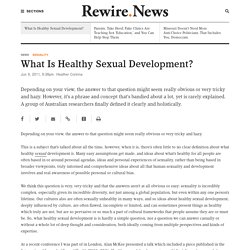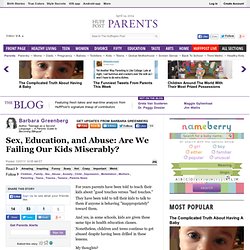

The Healthy Sex Talk: Teaching Kids Consent, Ages 1-21. What Is Healthy Sexual Development? Depending on your view, the answer to that question might seem really obvious or very tricky and hazy.

This is a subject that’s talked about all the time, however, when it is, there’s often little to no clear definition about what healthy sexual development is. Sex Education for Kids. Amazon. Teen Birthrate Plummets Because Girls Can Actually Get Birth Control. When Kathy is Keith: Surrey psychologist Wallace Wong releases transgender children's book. No one believes Kathy.

Not her friends, her teachers, her parents, not even Santa Claus. No one believes that she really is a boy. But Wallace Wong, a clinical psychologist of the Adolescent and Children Sexual Health Program of the Child and Youth Mental Health Services in Surrey, does. In fact, he made a book about it. Wong wrote the illustrated bookWhen Kathy is Keith, which broaches the sensitive and often misunderstood issues that transgender children face. Barbara Greenberg: Sex, Education, and Abuse: Are We Failing Our Kids Miserably? For years parents have been told to teach their kids about "good touches versus "bad touches.

" They have been told to tell their kids to talk to them if anyone is behaving "inappropriately" toward them. And yes, in some schools, kids are given these same tips in health education classes. Nonetheless, children and teens continue to get abused despite having been drilled in these lessons. Study highlights need for greater recognition of sexual and reproductive healthcare needs of teen boys. Two newly published reports by investigators at the Johns Hopkins Children's Center highlight the need for greater recognition of the sexual and reproductive healthcare needs of teen boys and enumerate the essential services this traditionally overlooked group should receive at least once a year.

The first report, published in the December issue of Pediatrics, underscores what experts say is glaring absence of guidelines on what sexual health tests and screening procedures teenage males should get and how often. The article offers a list of clinical practice recommendations to help fill that gap. "Many clinicians currently forego delivering some or many of these services because of limited time during visits, lack of evidence on the benefit of doing so and absence of guidelines on how to go about it," says lead author Arik Marcell, M.D., M.P.H., a teen health expert at Hopkins Children's.